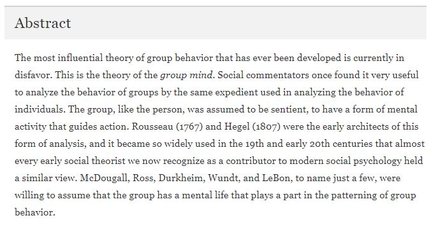
The most influential theory of group behavior that has ever been developed is currently in disfavor. This is the theory of the group mind. Social commentators once found it very useful to analyze the behavior of groups by the same expedient used in analyzing the behavior of individuals. The group, like the person, was assumed to be sentient, to have a form of mental activity that guides action. Rousseau (1767) and Hegel (1807) were the early architects of this form of analysis, and it became so widely used in the 19th and early 20th centuries that almost every early social theorist we now recognize as a contributor to modern social psychology held a similar view. McDougall, Ross, Durkheim, Wundt, and LeBon, to name just a few, were willing to assume that the group has a mental life that plays a part in the patterning of group behavior.
